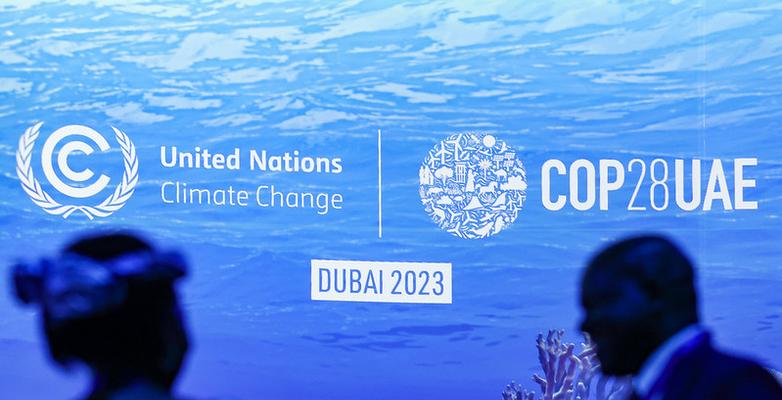
Is There a Vibe Shift Happening at COP 28?
4 min read
It's fair to say that the first week of COP 28 hasn't gone entirely to plan for COP President Dr. Sultan Al Jaber and the United Arab Emirates.
After opening the summit with a major win – the adoption of a long-sought loss and damage fund for Global South nations devastated by climate impacts – Al Jaber has been forced into playing defense.
It started Saturday, with what in previous years would've been easy PR coups. First, an agreement by 118 countries to triple renewable power by 2030. Second, the pledge from a group of 50 oil companies – including Exxon and Saudi Aramco – to slash methane emissions from operations to near zero by 2030.
But instead of universal praise for what countries and companies had agreed to – after all, both commitments are key steps on the global road to true net zero – much of the commentary instead focused on what they hadn't: phase out all fossil fuels.
Why? As the International Energy Agency underscores, reducing methane emissions quickly – the gas is 80 times more powerful at trapping heat over the short term than carbon dioxide – is critical to keeping global temperature goals in sight.
But methane is just part of the warming picture, and reducing emissions from operations is not the same as actually reducing production. In fact, many of these 50 companies making this pledge plan to greatly expand production, meaning there’ll be more oil and gas to burn and more net global warming pollution by 2030, not less.
Maybe in previous years, civil society would've taken the announcement at face value. But now the world has had nearly a year of industry figures like Al Jaber speaking movingly of loading the last barrel of oil as "a moment of celebration" while planning for massive expansion that "would bust the chances of limiting warming to 1.5 degrees." And with the industry having more representatives at this year's COP than almost any nation and a history of making big climate pledges only to walk them back, we are trained to look emissions gift horses in the mouth.
There is also the caveat that the industry's pledge was outside of the official COP process and comes without the same level of accountability as a negotiated outcome.
So instead of applauding the *potentially* real-but-not-enough gains coming from the industry announcement, over 300 groups – including Climate Reality – quickly branded the move for what it really is: greenwashing.
Big Oil Is Tired of Being Big Evil
For an industry used to controlling the narrative, there must be something uniquely unsettling about suddenly finding itself a magnet for criticism. Even before COP, Exxon CEO Darren Woods was complaining that turning oil companies into villains was easy, but does "absolutely nothing, to accomplish the goal of reducing emissions."
Al Jaber voiced similar frustrations in a recent interview with former Irish President Mary Robinson, saying:
“I don’t think [you] will be able to help solve the climate problem by pointing fingers or contributing to the polarisation and the divide that is already happening in the world. Show me the solutions. Stop the pointing of fingers. Stop it.”
In the same exchange, he went further, claiming, "There is no science out there, or no scenario out there, that says that the phase-out of fossil fuel is what’s going to achieve 1.5C.”
Never mind that the IPCC science makes it clear that without a phaseout we have little chance of limiting warming to 1.5 degrees. This was deeply disquieting admission from a man tasked with leading negotiations to keep 1.5 degrees within reach. But it was also a moment of truth, where the industry shows exactly what it's thinking – and what it's thinking is that fossil fuels are here to stay.
(Al Jaber has since defended his position, saying, “I have said over and over the phase-down and the phase-out of fossil fuel is inevitable. In fact, it is essential.")
The Future Hinges on a Preposition
If the frustration of some of the world's most powerful oil executives tells you anything, it's that something is happening. Already, over 100 nations have signaled support for an agreement to phase out unabated fossil fuels that would use carbon capture and storage (CCUS) to trap and sequester emissions.
This is progress, albeit not enough. As the IEA makes clear, we cannot rely on CCUS to halt rising temperatures alone, noting that if the industry massively expands production as planned, the electricity necessary to trap emissions by 2050 and keep warming at 1.5 degrees would be more than the entire planet used in 2022.
Never one to mince words, UN Secretary-General António Guterres laid out what the goal for COP 28 instead has to be: "The science is clear: The 1.5-degree limit is only possible if we ultimately stop burning all fossil fuels. Not reduce. Not abate. Phaseout – with a clear timeframe aligned with 1.5 degrees."
Former US Vice President Al Gore went even further, declaring, "There is only one measure of success for COP 28: will it include a commitment to phase out fossil fuels or not. If it does include such a commitment, it will be a smashing success; if it does not it will be a failure.”
Will we get there? Draft text of a final agreement now circulating includes the option of calling for a formal phaseout. Whether it makes to the final version we can't yet say. But what we can say is that the world is scrutinizing its relationship with the fossil fuels driving climate change like never before, and a window of possibility is opening. Maybe, just maybe.
To learn more about COP 28 and see what it's like to be on the ground at the UN's climate summit, watch 24 Hours of Reality: On the Ground at COP 28 on December 7: www.24hoursofreality.org.




